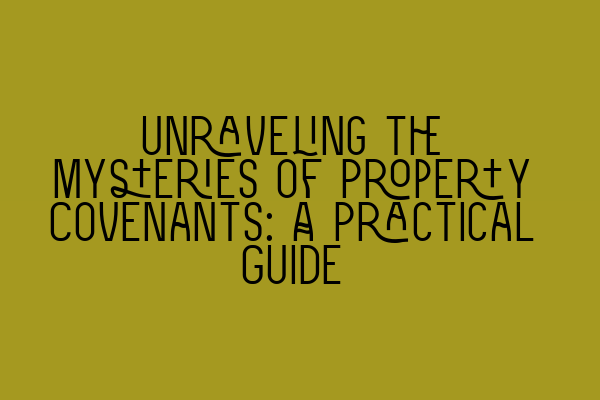Unraveling the Mysteries of Property Covenants: A Practical Guide
As a property solicitor, one of the most common areas of law that I deal with on a daily basis is property covenants. These legal restrictions can often be complex and confusing for both property owners and buyers alike. In this practical guide, I aim to demystify property covenants and provide you with a comprehensive understanding of their implications.
So, what exactly are property covenants? In simple terms, property covenants are legally binding obligations or restrictions that are attached to a property. These covenants can be found in various forms such as deeds, lease agreements, and title documents. The purpose of property covenants is to regulate the use and enjoyment of the property, ensuring that certain obligations are upheld by the property owner.
There are two main types of property covenants: positive covenants and restrictive covenants. Positive covenants require the property owner to do something, such as maintain a garden or contribute to the maintenance of a shared driveway. On the other hand, restrictive covenants prohibit certain activities or alterations to the property, such as not building further extensions or not using the property for commercial purposes.
Now that we have a basic understanding of what property covenants are, let’s delve deeper into the practical aspects of dealing with them.
1. Identifying Property Covenants:
The first step in unraveling the mysteries of property covenants is to identify whether there are any existing covenants attached to the property in question. This can be done by carefully reviewing the title deeds, lease agreements, or other relevant documents. It is crucial to pay attention to any specific wording or references to covenants, as well as any maps or plans that may outline their scope.
2. Understanding the Scope and Enforceability:
Once identified, it is essential to understand the scope and enforceability of the property covenants. Some covenants may have specific timeframes, while others may be perpetual. In addition, certain covenants may only be enforceable by specific parties, such as neighboring property owners or management companies. It is crucial to seek legal advice to determine the extent to which the covenants can be enforced.
3. Dealing with Breaches of Covenants:
If a property owner breaches a covenant, it can lead to legal consequences. Remedies for breaches can vary depending on the nature of the covenant and the specific circumstances. Common remedies include injunctive relief, damages, or the possibility of forced compliance. It is advisable to consult with a property solicitor if you are facing a breach of covenant or if you suspect that another party is in breach.
4. Discharging or Modifying Covenants:
In certain situations, it may be possible to discharge or modify property covenants. This can be done through a formal legal process, which typically involves obtaining the consent of all relevant parties or making an application to the Lands Chamber of the Upper Tribunal. The criteria for discharging or modifying covenants can be complex, so it is essential to seek legal advice to determine the feasibility and implications of such actions.
5. Transferring Property with Existing Covenants:
When buying or selling a property with existing covenants, it is crucial to ensure that all parties are aware of their existence. This can be achieved by conducting thorough due diligence and including appropriate contractual provisions in the sale and purchase agreement. Property solicitors play a vital role in assisting with the negotiation and drafting of these provisions to protect the interests of their clients.
In conclusion, property covenants are a critical aspect of property law that requires careful attention and understanding. By following the practical steps outlined in this guide, property owners and buyers can navigate the complexities of property covenants with confidence.
If you wish to further enhance your understanding of property law and prepare for your upcoming SQE exams, we offer comprehensive preparation courses at SQE Property Law & Land Law. To practice your knowledge and test your skills, we also provide SQE 1 practice exam questions and SQE 1 practice mocks FLK1 and FLK2.
Don’t forget to stay updated with the latest information on SRA SQE exam dates to ensure you are well-prepared for your exams.
For more information about our SQE preparation courses, visit our website: SQE 1 Preparation Courses and SQE 2 Preparation Courses.
Remember, knowledge is power, and with the right guidance, you can unravel the mysteries of property covenants and navigate property transactions with ease.
